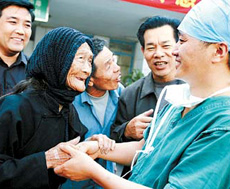
The standard of healthcare being offered to rural Chinese is far below that being received by people in cities and the gap is increasing, according to experts at a recent seminar on China's public health services.
It is a similar story when it comes to income and the two are no doubt linked.
In 1985, the disposable income of each urban family was almost double that of a farming family's total income.
By 2002, it had more than tripled.
The growing income gap results in quality of life issues, something that is all too real for China's poor.
People in urban areas tend to enjoy a longer and healthier life than farmers, according to Rao Keqin from the Ministry of Health's Statistics Information Centre.
And statistics revealed that in 2001, the rural neonatal and infant mortality rates were 2.3 times higher than those in urban areas.
All citizens, regardless of where they live and what they earn, have the right of quality healthcare.
While attempting to improve the income levels of farmers so they can afford to pay for a certain standard of medical service, policymakers also need to build them more hospitals and clinics.
Farmers in developed regions, like South China's Guangdong Province, get it better than most.
About 30 per cent of the 52 million farmers in the province are covered by the rural co-operative medical network, which means some of their medical costs are waived.
In the central and western parts of the country, however, the proportion of farmers with access is only about 5 per cent.
Alarmingly, only about 10 per cent of the nation's 783 million farmers have access to public or co-operative medical care.
And things are not likely to improve substantially anytime soon.
In rural areas, one-third of the township-level clinics are on the verge of financial collapse and State funding for the health networks at the county and township levels is far from enough, according to a policy proposal that was presented during the Second Session of the 10th Chinese People's Political Consultative Conference in March.
Urban areas have received priority over the rest of the nation for many years when it comes to healthcare and but it is time to balance the ledger.
Farmers need to have choices.
(China Daily December 7, 2004)
|

